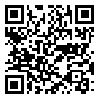Download citation:
BibTeX | RIS | EndNote | Medlars | ProCite | Reference Manager | RefWorks
Send citation to:



BibTeX | RIS | EndNote | Medlars | ProCite | Reference Manager | RefWorks
Send citation to:
Shayanmanesh M, Salmani F. Investigating the Relationship Between Research Self-Efficacy and Job Satisfaction Components Among Faculty Members of
Islamic Azad University, Najaf Abad Branch. Iranian Journal of Medical Education 2024; 24 :169-176
URL: http://ijme.mui.ac.ir/article-1-5786-en.html
URL: http://ijme.mui.ac.ir/article-1-5786-en.html
Nursing and Midwifery Sciences Development Research Center, Najafabad Branch, Islamic Azad University, Najafabad, Iran. , mz_shayanmanesh@yahoo.com
Abstract: (1328 Views)
Introduction: One of the most important factors influencing research among faculty members is their belief in their abilities in this field. Job satisfaction is considered an essential and effective indicator in evaluating the quality of education and research. This study aimed to determine the relationship between research self-efficacy and job satisfaction among faculty members of the Islamic Azad University, Najaf Abad Branch.
Methods: In this descriptive-correlational study, 180 faculty members from Najaf Abad University of Medical Sciences participated during the academic year 2024-2025. The sample size was determined using Cochran's formula and Morgan and Krejcie's table. Data were collected online using two standard questionnaires: the Minnesota Job Satisfaction Questionnaire and the Phillips and Russell Research Self-Efficacy Questionnaire. The collected data were analyzed using descriptive and inferential statistics (Pearson correlation test).
Results: The research self-efficacy of the participants, with an average score of 197.46±56.99, was at a desirable level. Their job satisfaction was also at a very good level, with an average score of 58.08±10.36. The components related to research self-efficacy capabilities were at an average level, while the job satisfaction components ranged from weak to moderate. A significant correlation was found between research self-efficacy and job satisfaction, as well as certain related components such as job type (a direct relationship in the medium range) and leadership style (a direct relationship in the weak range) (p<.05). However, no significant correlation was observed between research self-efficacy and other factors such as the payment system, opportunities for advancement, organizational climate, and physical conditions.
Conclusion: Considering the positive relationship between research self-efficacy and job satisfaction among faculty members, it is recommended that university authorities take effective measures to enhance research self-efficacy. This could be achieved by organizing research-related workshops, thereby increasing motivation for conducting impactful research among professors.
Methods: In this descriptive-correlational study, 180 faculty members from Najaf Abad University of Medical Sciences participated during the academic year 2024-2025. The sample size was determined using Cochran's formula and Morgan and Krejcie's table. Data were collected online using two standard questionnaires: the Minnesota Job Satisfaction Questionnaire and the Phillips and Russell Research Self-Efficacy Questionnaire. The collected data were analyzed using descriptive and inferential statistics (Pearson correlation test).
Results: The research self-efficacy of the participants, with an average score of 197.46±56.99, was at a desirable level. Their job satisfaction was also at a very good level, with an average score of 58.08±10.36. The components related to research self-efficacy capabilities were at an average level, while the job satisfaction components ranged from weak to moderate. A significant correlation was found between research self-efficacy and job satisfaction, as well as certain related components such as job type (a direct relationship in the medium range) and leadership style (a direct relationship in the weak range) (p<.05). However, no significant correlation was observed between research self-efficacy and other factors such as the payment system, opportunities for advancement, organizational climate, and physical conditions.
Conclusion: Considering the positive relationship between research self-efficacy and job satisfaction among faculty members, it is recommended that university authorities take effective measures to enhance research self-efficacy. This could be achieved by organizing research-related workshops, thereby increasing motivation for conducting impactful research among professors.
Type of Study: Original research article |
Subject:
other
Received: 2024/07/28 | Accepted: 2024/11/5 | Published: 2024/05/30 | ePublished: 2024/05/30
Received: 2024/07/28 | Accepted: 2024/11/5 | Published: 2024/05/30 | ePublished: 2024/05/30
Send email to the article author
| Rights and permissions | |
 |
This work is licensed under a Creative Commons Attribution-NonCommercial 4.0 International License. |






